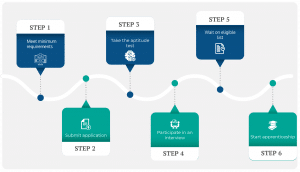Welcome to the world of the Caliper Assessment Test. This is a pre-employment assessment that has been trusted by businesses for over half a century. Since its inception in 1961, the Caliper Profile has been administered to more than 14 million individuals across 13 different languages worldwide. Caliper was acquired by Talogy and is now known as Talogy Caliper personality assessment.
The Caliper Assessment Test is designed to measure your potential as an employee beyond just your resume. It evaluates 22 different personality traits and cognitive abilities, providing a comprehensive understanding of your professional persona. These traits include but are not limited to leadership potential, problem-solving abilities, time management skills, and interpersonal communication.
The test format is a blend of approximately 180 multiple-choice questions and personality assessment items. While it typically takes about two hours to complete, the test is untimed, allowing you to take the time you need to accurately represent your abilities.
The Talogy Caliper personality assessment is not just another test—it’s a scientifically-backed tool with high predictive validity. It has been proven to correlate with job performance, making it a reliable predictor of your potential success in a role. The test’s validity has been established through rigorous scientific research and continuous refinement over its 60-year history.
The Caliper Assessment Test is not a pass-or-fail exam. It’s a tool for understanding your strengths and areas for development. As you prepare for this test, consider it as an opportunity to showcase your unique abilities and potential, and to gain insights into your professional capabilities.
Did you know?
The Talogy Caliper personality assessment comprises two main sections: Abstract Reasoning and Personality. Rather than a traditional score, it generates a profile of strengths and areas for development. It’s typically administered online and used by employers to inform hiring and development decisions. Successful test-takers often balance cognitive abilities and personality traits that align with the job role.
Caliper Question Types Explained
As you embark on your journey to take the Caliper Assessment Test, it’s important to understand its structure and purpose. This pre-employment tool, trusted by employers worldwide, is designed to evaluate your cognitive abilities and personality traits.
Comprising two main sections—Abstract Reasoning and Personality—the test provides a comprehensive profile of your potential as an employee. It’s not about right or wrong answers, but about understanding your unique blend of skills and traits. This section will help you understand the two types of tests in the Caliper Assessment, what each type of question assesses, and the skills necessary to perform well on each type.
- Abstract Reasoning Section: This section is designed to measure your cognitive abilities. It primarily consists of multiple-choice questions that require you to identify patterns, solve problems, and think critically. The questions often present a series of shapes or numbers, and your task is to determine the underlying pattern or rule. This section assesses your ability to think logically, analyze data, and make decisions. To perform well in this section, you need strong problem-solving skills, attention to detail, and the ability to think critically and analytically.
- Personality Section: This section evaluates your behavioral tendencies and personality traits. The questions are typically presented in a statement format, where you’re asked to rate how much you agree or disagree with a statement on a scale. This section assesses traits such as assertiveness, urgency, skepticism, and accommodation. The aim is to understand how you might behave in different work situations. To perform well in this section, it’s important to be honest and consistent in your responses. Remember, there are no right or wrong answers in this section—it’s about understanding your personality and how it might fit with a particular job role.
The table below provides a summary of the different types of questions in the Caliper Assessment Test, along with what each type of question assesses.
| Section | Question Type | What It Assesses |
|---|---|---|
| Abstract Reasoning | Number Series, Visual Analogy, Series Completion, Matrix Completion | Cognitive abilities such as numerical reasoning, spatial reasoning, pattern recognition, and logical reasoning |
| Personality | Most/Least Questions, Rating Questions | Personality traits and behavioral tendencies |
“The Caliper test is long and can be a bit tedious, but it’s a good way to assess your personality and motivations. I found the questions to be thought-provoking and challenging.”
Source: iPREP customer
Personality Section
As you navigate through the Caliper Assessment Test, you’ll encounter the Personality Section, a crucial part of the assessment that provides insights into your behavioral tendencies and personality traits. Unlike the Abstract Reasoning Section, which focuses on your cognitive abilities, the Personality Section delves into who you are as an individual—your attitudes, preferences, and typical behaviors. It’s not about right or wrong answers, but about understanding your unique personality and how it might fit within a professional context.
This section primarily consists of two types of questions—Most/Least Questions and Rating Questions—each designed to explore different facets of your personality. In the following guide, we’ll explore each type of question, what they assess, and the approach necessary to perform well on each type.
| Question Type | What It Assesses | Approach |
|---|---|---|
| Most/Least Questions | Various personality traits and behavioral tendencies | Introspection, honesty |
| Rating Questions | Attitudes, preferences, and typical behaviors | Honesty, consistency |
Most/Least Questions
These questions present you with a set of four statements, and you’re asked to identify which statement is most like you and which is least like you. These questions assess a range of personality traits, such as assertiveness, empathy, risk-taking, and patience, among others. They aim to understand how you might behave in different work situations. To perform well on these questions, it’s important to be introspective and honest. Remember, there are no right or wrong answers in this section—it’s about understanding your personality and how it might fit with a particular job role.
Your answer sheet will have two responses for each of these types of questions.
| Most | Least | |
|---|---|---|
| I sometimes have the feeling that I am taking too much responsibility upon me. | ||
| I have the ability to persuade people to do almost anything. | ||
| I cannot imagine myself lying or cheating. | ||
| I seem to enjoy interacting with people more than others do. |
Rating Questions
These questions present you with a statement, and you’re asked to rate how much you agree or disagree with the statement on a five-point scale. These questions also assess various personality traits and behavioral tendencies. They aim to gauge your attitudes, preferences, and typical behaviors. To excel in these questions, honesty and consistency are key. Try to avoid extreme responses unless the statement truly represents or opposes your personality.
In the Rating Question type of the Personality Section, you’ll be presented with a statement and asked to rate your level of agreement on a five-point scale, as demonstrated in the following example:
| Statement | Strongly Disagree | Disagree | Neutral | Agree | Strongly Agree |
|---|---|---|---|---|---|
| I enjoy working in a team-oriented environment. |
In this question, you would select the option that best represents your level of agreement with the statement. For example, if you strongly agree with the statement, you would select the “Strongly Agree” option.
As you prepare for this section, focus on understanding yourself better and being honest and consistent in your responses.
Abstract Reasoning Section
As you prepare for the Caliper Assessment Test, one of the key sections you’ll encounter is the Abstract Reasoning Section. This part of the test is designed to measure your cognitive abilities, specifically your capacity to identify patterns, solve problems, and think critically. Unlike other sections, the Abstract Reasoning Section doesn’t focus on what you know, but rather on how you think.
The section comprises four main types of questions—Number Series, Visual Analogy, Series Completion, and Matrix Completion. Each type of question is designed to assess a different aspect of your cognitive abilities. In this guide, we’ll delve into each type of question, explaining what they assess and the skills necessary to perform well on each type.
| Question Type | What It Assesses | Skills Necessary |
|---|---|---|
| Number Series | Numerical reasoning and pattern recognition | Analytical skills, attention to detail |
| Visual Analogy | Spatial reasoning and understanding of visual relationships | Spatial awareness, visual thinking |
| Series Completion | Pattern recognition and logical reasoning | Observational skills, logical thinking |
| Matrix Completion | Understanding of complex patterns and spatial reasoning | Multi-dimensional thinking, pattern analysis |
Number Series Questions
These questions present a series of numbers with an underlying pattern or rule. Your task is to identify this pattern and predict the next number in the series. They assess your numerical reasoning and ability to recognize patterns. To perform well on these questions, you need strong analytical skills and attention to detail.
Try a Number Series Sample Question
What is the next number in the following series of numbers?
3 5 9 17 33
- 45
- 57
- 65
- 71
The correct answer is 65.
Explanation:
Look at the differences between the numbers:
3 5 9 17 33
+2 +4 +8 +16
*2 *2 *2
The differences between each term are multiplied by 2 in every step. Therefore, the difference between the last displayed number of the series and the next number should be 16*2 = 32.
The next number of the series is, therefore, 33 + 32 = 65.
Another way to look at the differences is to realize that there is a consistent relationship between the series of differences and the original series. Each difference equals the number of the series minus one (“1”), or simply each number in the series of differences is the previous natural number in comparison to the original series.
It can be formally written as follows: an+1 = an + (an – 1)
For learning purposes, the next numbers of the series would be:
65 + 64 = 129
129 + 128 = 267
Visual Analogy Questions
These questions require you to identify relationships between different shapes or figures. You’ll be given a pair of shapes with a specific relationship, followed by another shape and a set of options. Your task is to select the shape that has the same relationship with the third shape. These questions assess your spatial reasoning and ability to understand visual relationships. To excel in these questions, you need good spatial awareness and the ability to think visually.
Try a Visual Analogy Sample Question
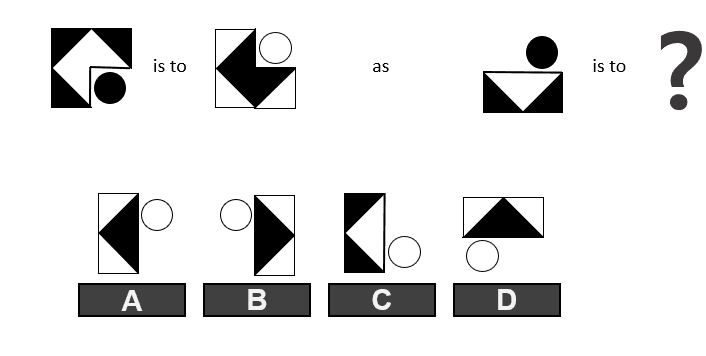
The correct answer is B.
Explanation:
Two steps create the transition between elements ONE and TWO:
Step 1 – the entire element rotates 90 degrees counterclockwise.
Step 2 – sections that were black become white and sections that were white become black.
In order to maintain the analogy, element THREE must go through the same process:
Step 1 – the entire element rotates 90 degrees counterclockwise. At this point, the element will look like this:

Note that you can already choose the correct answer based on this observation as only answer B is in the appropriate orientation.
Step 2 – black and white sections switch colors. Answer B maintains this observation, too.
Series Completion Questions
These questions present you with a series of shapes or figures following a certain pattern. Your task is to complete the series by selecting the shape or figure that comes next. They assess your pattern recognition and logical reasoning skills. To perform well on these questions, you need to be observant, able to identify patterns, and think logically.
Try a Figural Series Completion Sample Question
Which of the figures below the line will replace the question mark, following the sequence of figures shown?
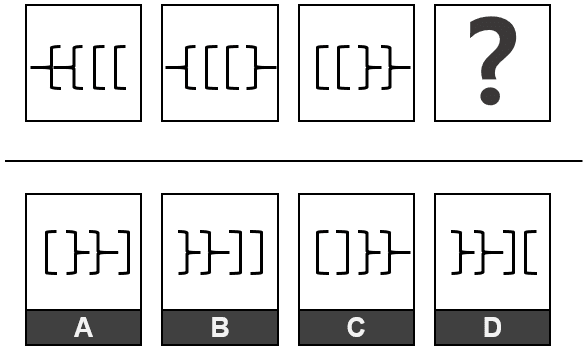
The correct answer is A.
Explanation: Each element contains four brackets aligned horizontally. From left to right, the leftmost bracket of an element becomes the rightmost bracket of the next element. In its new location, the bracket rotates 180 degrees and faces the other opposite direction. In the missing element, the simple bracket moves to the rightmost position and faces the same direction as the curly brackets, as presented in answer A.
Matrix Completion Questions
These questions present you with a matrix of shapes or figures with one missing element. Your task is to complete the matrix by selecting the shape or figure that fits the pattern. They assess your ability to understand complex patterns and your spatial reasoning skills. To excel in these questions, you need to be able to think in multiple dimensions and analyze complex patterns.
Try a Matrix Completion Sample Question
Which of the following should replace the question mark (?) to complete the pattern?
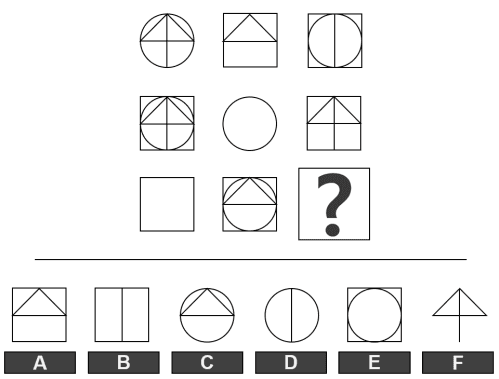
The correct answer is C.
Explanation: Take any two elements of one column or of one row and compare them. If they share a feature, then the third element of that column/row does not include that same feature. On the contrary, if there is a feature that appears in only one of them, it is included in the third element as well.
For example, the left column – the top and the middle elements are identical except for the square that surrounds the middle element. Therefore, none of the features comprise the bottom element but the surrounding square.
The missing element – elements 7 and 8 of the bottom row – share one feature, a square. The features inside the square of element 8 are unique to element 8, and element 7 has no unique features. The missing element, thus, is identical to the unique features of element 8.
Remember, the Abstract Reasoning Section is about your ability to think logically, recognize patterns, and solve problems. It’s about how you think, not what you know. So, as you prepare for this section, focus on honing your analytical skills, improving your spatial awareness, and strengthening your ability to think logically and critically.
“The Caliper test is a bit different from other personality tests I’ve taken. It’s more focused on your work style and how you interact with others. I found it to be a valuable tool for self-reflection.”
Source: iPREP customer
Caliper Preparation Strategies
Preparing for the Caliper Assessment Test is not about cramming facts or figures—it’s about understanding the test structure, honing your cognitive abilities, and gaining self-awareness about your personality traits. As you embark on your preparation journey, remember that this test is not about right or wrong answers, but about showcasing your potential as a successful employee. Here are some authoritative strategies to help you prepare effectively:
- Understand the Test Structure: Familiarize yourself with the two main sections of the test—Abstract Reasoning and Personality. Understanding the types of questions you’ll encounter will help you know what to expect and reduce test anxiety.
- Practice Abstract Reasoning Questions: Enhance your cognitive abilities by practicing similar types of questions. This includes number series, visual analogies, series completion, and matrix completion questions. There are numerous resources available online that can help you practice these skills.
- Reflect on Your Personality Traits: The Personality Section is about understanding your unique behavioral tendencies. Reflect on your strengths, weaknesses, and typical behaviors. This self-awareness will help you answer the personality questions honestly and consistently.
- Take Practice Tests: Practice tests can help you familiarize yourself with the test format and timing. They can also help you identify areas where you need to improve. Remember, the goal is not to memorize answers, but to understand the reasoning behind them.
- Develop a Study Schedule: Consistency is key when preparing for the Caliper Assessment Test. Develop a study schedule that allows you to practice regularly. This will help you build confidence and improve your test-taking skills.
- Stay Healthy: Your physical health can impact your cognitive abilities. Ensure you’re getting enough sleep, eating a balanced diet, and exercising regularly. This will help you stay focused and perform at your best on test day.
Remember, the Caliper Assessment Test is not a pass-or-fail exam—it’s a tool for understanding your strengths and areas for development. As you prepare for this test, consider it as an opportunity to showcase your unique abilities and potential, and to gain insights into your professional capabilities. With the right preparation strategies, you can approach the test with confidence and poise.
Test Features
Overview of the Caliper Assessment Test
| Aspect | Description |
|---|---|
| Purpose | To measure a candidate’s potential as a successful employee |
| Format | Multiple-choice test |
| Sections | Abstract Reasoning and Personality |
| Duration | Typically about 2 hours |
| Administration | Primarily online |
The table above provides an overview of the Caliper Assessment Test, including its purpose, format, sections, typical duration, and administration method.
Purpose of the Test
The primary purpose of the Caliper Assessment Test is to measure a candidate’s potential as a successful employee. It evaluates a wide range of skills, including leadership potential, problem-solving abilities, time management skills, and interpersonal communication. The test is designed to predict job performance across a variety of roles and industries, making it a versatile and valuable tool for employers.
Comprehensive Assessment
The Caliper Assessment Test provides a comprehensive evaluation of a candidate’s cognitive abilities and personality traits. It comprises two main sections—Abstract Reasoning and Personality—each designed to assess different aspects of a candidate’s potential.
Untimed Test
Unlike many other assessments, the Caliper Assessment Test is untimed. This allows candidates to take the time they need to accurately represent their abilities. However, it typically takes about two hours to complete.
Online Administration
The Caliper Assessment Test is typically administered online, making it accessible to candidates from anywhere. This also allows for quick and efficient scoring and reporting of results.
Scientifically Validated
The Caliper Assessment Test is a valid and reliable tool, backed by over 50 years of scientific research. Its results have been proven to correlate with job performance, making it a reliable predictor of a candidate’s potential success in a role.
Used for Various HR Purposes
While primarily used for hiring decisions, the results of the Caliper Assessment Test can also be used for team building, leadership development, and employee coaching. This makes it a versatile tool for various human resources functions.
Common Names of the Caliper test
The Caliper Assessment Test is known by several common names, including:
- Caliper Profile
- Caliper Personality Profile
- Caliper Test
- Caliper Metrics
- Caliper Pre-Employment Assessment
- Caliper Talent Management Assessment
“I took the Caliper test for a job I really wanted, and I was worried that I would fail it. But I ended up doing well, and I think the test helped me to get the job. I’m glad I took the time to prepare for the test, and I would recommend it to anyone who is applying for a job that requires the Caliper test.”
Source: iPREP customer
iPREP: Concise. Focused. What you need.
Sign up
Immediate access
Practice
Online self-paced
Pass
Ace that Test!
Technical Facts
Fast Facts (tl;dr)
- Multiple-choice test format.
- Two main sections: Abstract Reasoning and Personality.
- Typically takes about 2 hours to complete.
- Administered online or on paper.
- Generates a profile mapping strengths and areas for development.
- Validated tool with results correlating with job performance.
- Available in 13 different languages.
- Used for hiring, team building, leadership development, and coaching.
- No traditional scoring system.
- Untimed test, allowing candidates to take the time they need.
Test Format
The Caliper Assessment Test is primarily a multiple-choice test, with questions designed to assess both cognitive abilities and personality traits. It comprises two main sections—Abstract Reasoning and Personality—with different types of questions in each section.
Test Duration
While the Caliper Assessment Test is untimed, it typically takes about two hours to complete. This allows candidates to take the time they need to accurately represent their abilities.
Test Administration
The Caliper Assessment Test is typically administered online, but can also be taken on paper. This flexibility allows it to be accessible to candidates from various locations and circumstances.
Scoring System
The Caliper Assessment Test does not have a traditional scoring system. Instead, it generates a profile that maps a candidate’s strengths and areas for development. This profile is then used to predict the candidate’s potential success in a role.
Test Validity
The Caliper Assessment Test is a scientifically validated tool. Its results have been proven to correlate with job performance, making it a reliable predictor of a candidate’s potential success in a role.
Test Languages
The Caliper Assessment Test is available in 13 different languages, making it accessible to a diverse range of candidates worldwide.
Test Usage
While primarily used for hiring decisions, the results of the Caliper Assessment Test can also be used for team building, leadership development, and employee coaching. This makes it a versatile tool for various human resources functions.
Seven competency areas of the Caliper Profile
Caliper has developed a comprehensive competency library, with 56 different competencies divided into 7 sections. After taking the test, the hiring manager or HR team will have insight into your strengths and weaknesses within the following areas.
| 1. Leading | 2. Active Communication | 3. Interpersonal Dynamics |
|---|---|---|
| Leadership Maturity | Influence and Persuasion | Interpersonal Sensitivity |
| Leadership Communication | Conflict Management | Helpfulness |
| Driving Results | Negotiating | Service Focus |
| Leading Change | Active Listening | Relationship Building |
| Managing Innovation | Communicating | Collaboration and Teamwork |
| Managing Quality | Instructing | Organizational Savvy |
| Team Building | Global Mindset | |
| Coaching and Developing Others | ||
| Delegating | ||
| Fact-Based Management | ||
| Strategic Talent Management | ||
| Directing |
| 4. Making Decisions | 5. Solving Problems | 6. Managing Processes | 7. Self-Management |
|---|---|---|---|
| Deliberative Decision Making | Creativity and Innovation | Quality Focus | Composure and Resiliency |
| Decisiveness | Analytical Thinking | Compliance | Generating and Expressing Enthusiasm |
| Strategic Thinking | Learning Agility | Response Orientation | Strength of Conviction |
| Organizational Citizenship | Scientific Acumen | Safety Focus | Achievement Motivation and Perseverance |
| Information Seeking | Business Acumen | Process Management | Self-Awareness |
| Time Management | Adaptability | ||
| Planning and Priority Setting | Initiating Action | ||
| Organizing and Documenting Information | Accountability | ||
| Applying Standard Practices | Professionalism | ||
| Continuous Learning | |||
| Extended Task Focus | |||
| Comfort with Ambiguity |
Results Scale and Interpretations
As you prepare for the Caliper Assessment Test, it’s important to understand how your results will be scored and interpreted. Unlike traditional tests that provide a simple score, the Caliper Assessment Test generates a comprehensive profile of your cognitive abilities and personality traits. This profile, which includes various components such as percentile ranking and sub-scores, provides a detailed view of your strengths and areas for development. In this guide, we’ll delve into the different components of the score report and explain how they can be used to assess your potential as a successful employee.
Scoring and Interpretation of the Caliper Assessment Test
The table below provides an overview of how the results from the Caliper Assessment Test are scored and interpreted, including the raw score, percentile ranking, sub-scores, and score range.
| Component | Description |
|---|---|
| Raw Score | Generates a profile mapping strengths and areas for development |
| Percentile Ranking | Indicates performance relative to other test-takers |
| Sub-Scores | Provides a detailed view of strengths and areas for development for different traits and abilities |
| Score Range | Indicates the degree to which a trait or ability is exhibited |
Raw Score
The Caliper Assessment Test doesn’t provide a traditional raw score. Instead, it generates a profile that maps your strengths and areas for development. This profile is based on your responses to the questions in both the Abstract Reasoning and Personality sections of the test.
Percentile Ranking
The test results include a percentile ranking, which indicates how you performed relative to other individuals who have taken the test. For example, if your percentile rank is 70, it means you scored higher than 70% of the individuals in the comparison group.
Sub-Scores
The test results also include sub-scores for the different traits and abilities assessed. These sub-scores provide a more detailed view of your strengths and areas for development. For example, you might receive sub-scores for traits such as assertiveness, urgency, skepticism, and accommodation.
Score Range
The Caliper Assessment Test uses a score range to indicate the degree to which you exhibit a particular trait or ability. For example, a score range for a trait might be from 1 to 99, with higher scores indicating a greater degree of that trait.
Interpretation of Scores
The interpretation of scores is not about passing or failing, but about understanding your unique blend of traits and abilities. For example, a high score in assertiveness might suggest that you’re likely to take charge in team situations, while a low score might suggest that you’re more likely to take a supportive role.
Suggested Score Ranges
There are no suggested score ranges for the Caliper Assessment Test. Instead, the ideal score range depends on the specific job role. For example, a role that requires strong leadership might prefer candidates with high scores in assertiveness and decision-making.
Assessing Candidate’s Ability to Perform
The score report can be used to assess a candidate’s ability to perform in a specific role. For example, if a role requires strong problem-solving skills, a candidate with a high score in this area might be a good fit. Similarly, if a role requires a high degree of teamwork, a candidate with a high score in cooperation might be a good fit.
Understanding the scoring and interpretation of the Caliper Assessment Test can help you make sense of your results and identify areas where you might need to improve. Remember, this test is not about passing or failing—it’s about showcasing your unique blend of traits and abilities. The score report is a tool that can help you understand yourself better and guide your professional development. As you prepare for the test, keep in mind that every score is an opportunity for learning and growth.

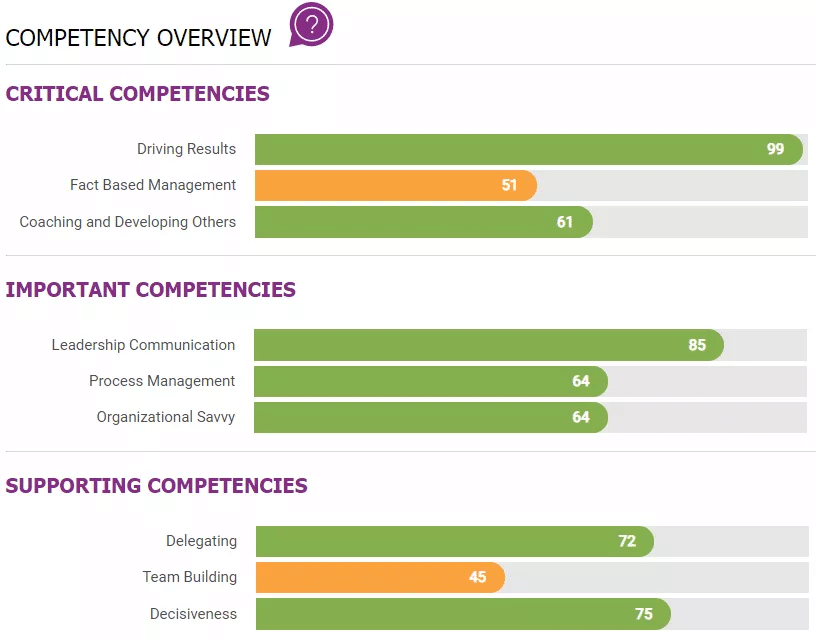
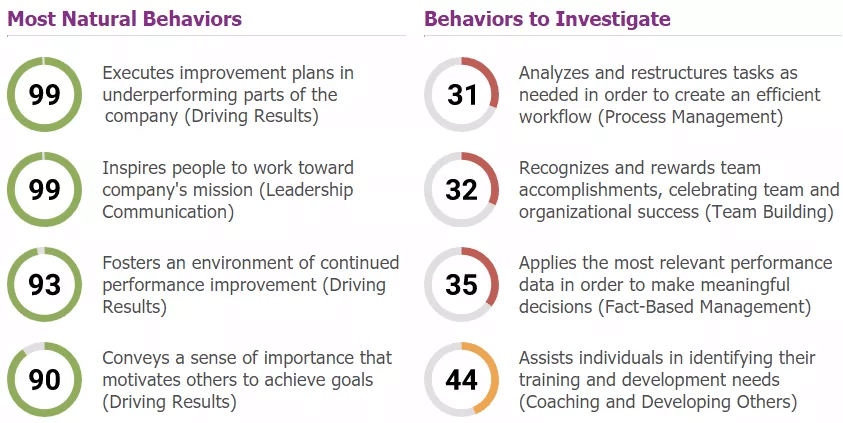

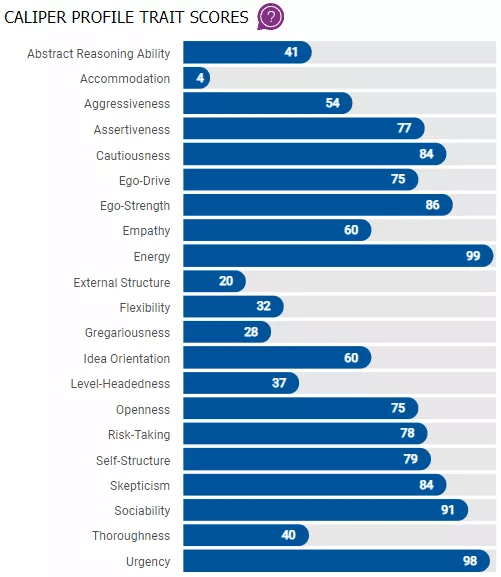
Caliper Assessment FAQs
The Caliper Assessment Test is a pre-employment tool used by employers to evaluate a candidate’s cognitive abilities and personality traits. It’s designed to predict job performance across a variety of roles and industries.
The test measures a wide range of skills, including leadership potential, problem-solving abilities, time management skills, and interpersonal communication. It also assesses various personality traits such as assertiveness, urgency, skepticism, and accommodation.
The test comprises two main sections—Abstract Reasoning and Personality—with different types of questions in each section. It’s primarily a multiple-choice test.
While the test is untimed, it typically takes about two hours to complete.
The test doesn’t provide a traditional score. Instead, it generates a profile that maps your strengths and areas for development. The results include a percentile ranking and sub-scores for the different traits and abilities assessed.
Employers use the results to make informed decisions about hiring. The test helps employers understand a candidate’s potential for success in a role, making it a crucial part of the recruitment process.
No, the Caliper Assessment Test is not a pass-or-fail exam. It’s a tool for understanding your strengths and areas for development.
Yes, the Caliper Assessment Test is a scientifically validated tool. Its results have been proven to correlate with job performance, making it a reliable predictor of a candidate’s potential success in a role.
Yes, understanding the test structure, practicing similar types of questions, and gaining self-awareness about your personality traits can help you prepare for the test.
While primarily used for hiring decisions, the results of the Caliper Assessment Test can also be used for team building, leadership development, and employee coaching. This makes it a versatile tool for various human resources functions.
Caliper Assessment Test Tips
- Understand the Test Structure: Familiarize yourself with the structure of the test and the types of questions you’ll encounter. This will help reduce test anxiety and allow you to navigate the test more efficiently.
- Practice, Practice, Practice: While you can’t memorize answers for the Caliper Assessment Test, practicing similar types of questions can help you hone your cognitive abilities and understand your personality traits better. Practice tests can also help you get used to the test format and timing.
- Be Honest: In the Personality Section, it’s important to be honest and consistent in your responses. Remember, there are no right or wrong answers in this section—it’s about understanding your personality and how it might fit with a particular job role.
- Manage Your Time: Although the test is untimed, it’s still important to manage your time effectively. Try not to spend too much time on any one question. If you’re stuck, move on to the next question and come back later if time allows.
- Stay Calm: Test anxiety can affect your performance. Try to stay calm and focused during the test. Deep breathing exercises can help reduce anxiety and improve concentration.
- Read Questions Carefully: Make sure to read each question carefully before answering. Misunderstanding a question can lead to incorrect answers.
- Prepare for Test Day: Make sure you get a good night’s sleep before the test day, eat a healthy meal, and arrive early to the test center. This will help you stay focused and perform at your best.
“The Caliper test was a bit challenging for me, but I think it was a good challenge. The questions forced me to think about my personality and motivations in a way that I hadn’t before. I think the test was a valuable tool for self-reflection.”
Source: iPREP customer
Administration
- Test Location: The Caliper Assessment Test is typically administered online, allowing you to take the test from any location with a stable internet connection.
- Test Schedule: The test is usually scheduled by the employer as part of the hiring process. You’ll be given a specific date and time to take the test.
- Test Format: The test is computerized and consists primarily of multiple-choice questions. It comprises two main sections—Abstract Reasoning and Personality.
- Test Materials: Since the test is administered online, you won’t need any physical materials like pen and paper. However, you might find it helpful to have scratch paper and a pen for the Abstract Reasoning section.
- Cost: The cost of the test is typically covered by the employer. If you’re taking the test as part of a job application, you shouldn’t have to pay any fees.
- Retake Policy: The retake policy can vary depending on the employer. Some employers might allow retakes, while others might not. It’s best to check with the employer for specific details.
Test Provider
The Caliper Assessment Test is developed and administered by Caliper, which is now part of Talogy, a talent management company specializing in employee assessments. Caliper has been providing personality assessment and talent evaluation services for decades and continues to be widely used by businesses across various industries to help identify candidates’ strengths, work styles, and potential job fit.
The test is available in multiple languages and is used internationally as part of hiring and development processes. In addition to the Caliper Profile (Talogy Caliper Personality Assessment), Talogy offers other talent management solutions, including leadership assessments, employee development tools, and coaching services.
Information Sources
Disclaimer – All the information and prep materials on iPrep are genuine and were created for tutoring purposes. iPrep is not affiliated with the Talogy, Caliper Corp., or any other company mentioned.
Free CALIPER practice test: Get to know what the cognitive ability section of the Caliper Assessment will be like by practicing with these sample questions:
Abstract Reasoning Question 1 of 8
What is the next number in the following series of numbers?
-1 2 1 3 4
- 5
- 7
- 1
- 6
The correct answer is 7.
Explanation:
Look at the differences between the numbers:
-1 2 1 3 4
+3 -1 +2 +1
While there is no simple pattern to the differences, you do get a hint: all the elements of the series of the differences, except the first one, appear in the same order as the numbers of the original series. You can assume that the next difference will be +3 as it is the number that follows 1 in the original series.
Therefore, the next number of the series is 4 + 3 = 7
The complete logic of the series is that every term in the series equals the sum of the previous two terms.
It can be formally written as follows: an+2 = an + an+1
For learning purposes, here is the series, had it continued for several more steps:
-1 2 1 3 4 7 11 18 29 47
+3 -1 +2 +1 +3 +4 +7 +11 +18
And for general knowledge: Did you know that any series of numbers in which each number (third in sequence and above) is the sum of the two preceding numbers is known as the Fibonacci sequence, named after Italian mathematician Leonardo of Pisa, known as Fibonacci?
Abstract Reasoning Question 2 of 8
What is the next number in the following series of numbers?
1 1 2 4 6 18 21
- 84
- 63
- 26
- 24
The correct answer is 84.
Explanation:
Look at the differences between the numbers. After writing them on your scratch paper, you will notice two alternating patterns:
1 1 2 4 6 18 21
*1 +1 *2 +2 *3 +3
The first pattern is multiplication; in every second step, the multiplier increases by 1. The second pattern is an addition; in every second step, the increment increases by 1 as well. According to this observation, the next number of the series follows the first pattern and is equal to the last number times four (*4).
The next number of the series is 21*4 = 84
For learning purposes, here is the series, had it continued for several more steps:
1 1 2 4 6 18 21 84 88 440 445
*1 +1 *2 +2 *3 +3 *4 +4 *5 +5
Things to consider:
- When you see that the number hasn’t changed in one of the steps of the series, you should consider two main options:
- The difference represents a step of “+0”, which is usually a part of a sub-series of increments (+0, +1, +2, +3, etc.) or a sub-series of diminishing increments (+2, +1, +0, -1, etc.)
- The difference represents a step of “*1”, which is usually a part of a sub-series of incremental multiplication (*1, *2, *3, etc.)
- Think of the difference between the numbers 2 and 4. It can be equivalently described as an addition of 2 or multiplication by 2. Similarly, the difference between 1 and 2 can be equivalently described as an addition of 1 or multiplication by 2.
Remember these examples and try to recall them if you encounter these steps in future problems.
Abstract Reasoning Question 3 of 8
Which of the figures below the line will replace the question mark, following the sequence of figures shown?
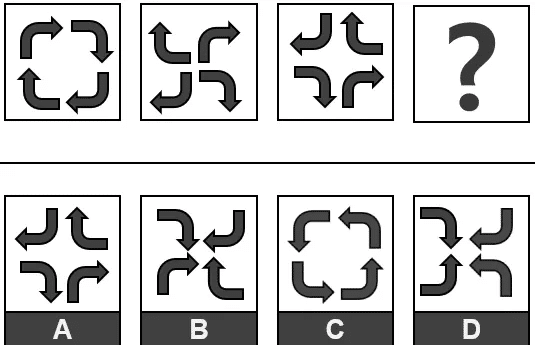
The correct answer is B.
Explanation: Each element in the sequence contains four inner shapes. Although it may seem as if these four shapes create a meaningful structure, they actually don’t. In each step in the sequence, each of the four elements rotates 90 degrees counterclockwise. In the missing element, each of the inner shapes would complete a 270-degree rotation in comparison to the first element.
An alternative explanation is that you can imagine each element as having four quarters, each holding a different shape. At each step within the sequence, each of the inner shapes moves to the neighboring quarter, going clockwise.
Tips:
- Remember to look for simple solutions.
- It is often easier to follow the logic of one or two of the inner shapes. In many cases, that would be enough to identify the correct answer from the distractors.
Abstract Reasoning Question 4 of 8
Which of the figures below the line will replace the question mark, following the sequence of figures shown?
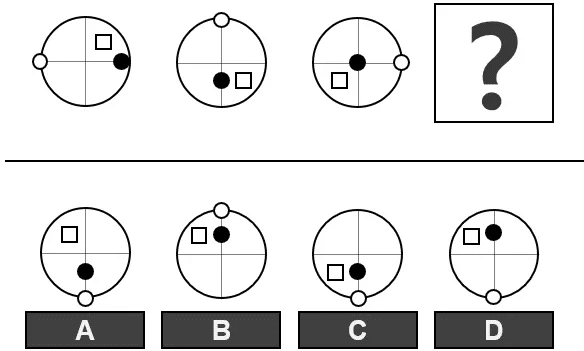
The correct answer is A.
Explanation:
Each element is comprised of a square divided by two lines and of three shapes—a black circle, a white circle, and a white square.
The logic of the series is based on two processes:
- In each step, the element is rotated 90 degrees clockwise. The rotation cannot be recognized if one only looks at the big circle and the lines because of its symmetry; however, you can follow the white circle and the white square and realize that they maintain their relative positions. Assuming the trend continues, and the element is rotated 90 degrees again, then answers A and D represent the expected positions of the white circle and the white square.
- In addition to the rotation, the black circle moves along the line it is initially positioned on. In each step, the black circle gets closer to the white circle, which is the case in answers A, B, and C.
Altogether, only answer A displays an accurate combination of both of the processes.
Tips & Tricks:
- Symmetry is an element that may be very confusing in abstract reasoning tests. In order to avoid this confusing factor, focus on a single distinct feature and try to assess the nature of the general logic through it.
Abstract Reasoning Question 5 of 8
Which of the following should replace the question mark (?) to complete the pattern?
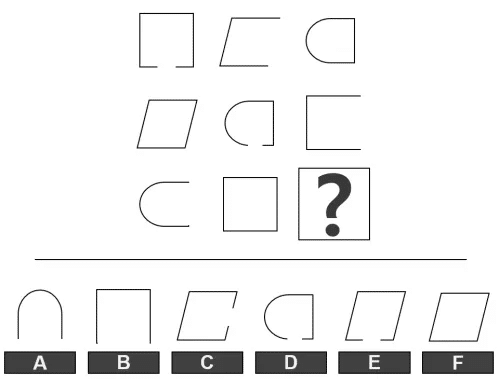
The correct answer is E
Explanation:
The matrix follows two logical rules:
The shape is determined by the 2-4-9 diagonal:
Elements 1,6,8 are squares; elements 3,5,7 have a rectangular right side and a semi-circle left side; elements 2,4 are parallelograms. Therefore, the correct answer should be a parallelogram too.
The outline is determined by the 1-5-9 diagonal:
Elements 3,4,8 have a complete outline; elements 2,6,7 are missing the right side of the outline; elements 1,5 have a gap in the bottom part of the outline. Therefore, the correct answer should have a gap too.
Option E satisfies both rules.
Tips & Tricks:
- Almost every time that you encounter a matrix with two sets of three elements that have a certain feature, and another two visible elements that have a different realization of the same feature – the correct answer will include a similar feature to that of the latter two elements. You can use this method in order to systematically eliminate options.
Abstract Reasoning Question 6 of 8
Which of the following should replace the question mark (?) to complete the pattern?
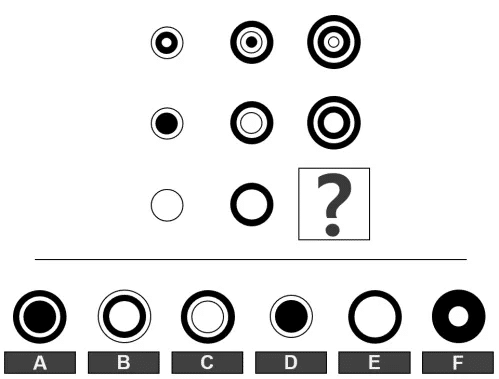
The correct answer is A
Explanation:
The solution is arrived at by understanding the logic of the matrix by columns.
Each of the elements of the top row includes several circles one on top of the other. Smaller circles are always on top of larger ones. With every step down, the top circle is removed.
For example, in the left column, the top element is comprised of three circles. In the middle element, the top little white circle is removed and it makes the black circle below it more visible. In the bottom element, the black circle is also removed and only the larger white circle remains.
In the right column, the top element includes five circles. The missing element is a product of removing the top two circles, which means that a black circle would remain on top, and beneath it, there would be a larger white circle and an even larger black circle – option A.
Tips & Tricks:
It is “tempting” to provide a logical explanation for the differences between the elements of the same row. While you can propose some explanation, it is less intuitive and is merely a more complex description of the differences by column. If you encounter cases in which you can provide a valid, yet complex logical explanation to one perspective of the matrix (i.e. logic by rows/columns/diagonals/etc.), try to take a step back and look at the matrix from a different perspective. It may make your solution much simpler.
Abstract Reasoning Question 7 of 8
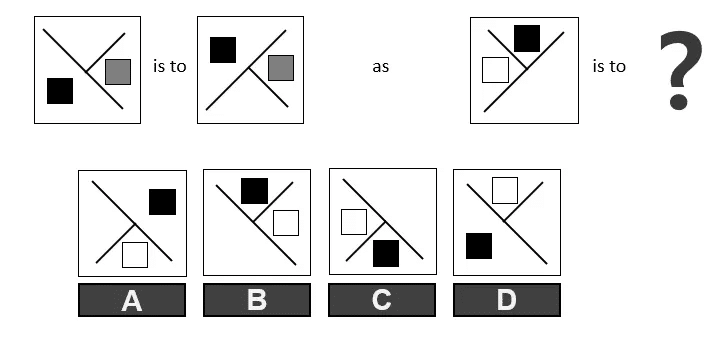
The correct answer is C.
Explanation:
Element TWO is a vertical flip of element ONE. If you vertically flip element THREE, you get answer C, which is element FOUR.
Tips & Tricks:
- Note that if you only examine the perpendicular lines in element ONE, it seems as if they need to be rotated 90 degrees clockwise in order to get to their position in element TWO. This rotation, however, does not explain the rest of the differences between elements ONE and TWO.
Oftentimes it is difficult to distinguish between rotations and flips, especially in regard to elements with some symmetrical features. Remember this fact in future cases where you perceive an analogy as a rotation or as a flip but you cannot completely explain the differences this way.
Abstract Reasoning Question 8 of 8
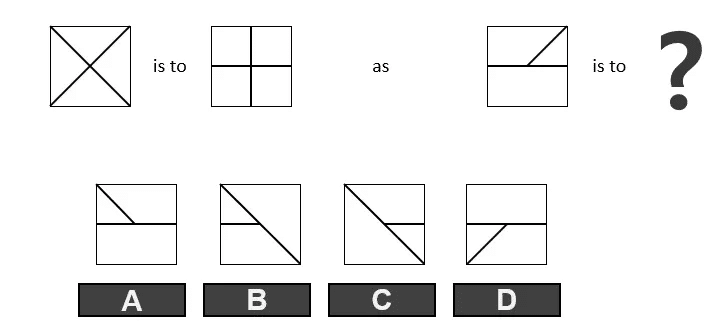
The correct answer is C.
Explanation:
Imagine that each square is a “clock” with a few hands and eight “hours.” This image highlights the “hours” of the clock and one of the hands, which will be discussed below –

Between elements ONE and TWO, each of the hands has moved one “hour” clockwise.
Answer C is analogous to element THREE in the same manner. The two hands which form a horizontal line in element THREE move one hour clockwise and form a diagonal line from the top-left corner to the bottom-right corner. The third diagonal hand moves and forms a horizontal line that points to the right.
Personality Rating Question 1 of 2
Statement:
I appreciate alternative and unordinary ways of thinking.
Response Options (Select One):
○ Strongly Agree
○ Agree
○ Mildly Agree
○ Neither Agree nor Disagree
○ Mildly Disagree
○ Disagree
○ Strongly Disagree
Personality Scale: Openness
What this statement assesses:
This question evaluates a candidate’s inclination toward creativity, curiosity, and receptiveness to new ideas.
Interpretation of Responses:
- High Agreement (Strongly Agree/Agree): Indicates that the individual is open-minded, values innovation, and readily entertains unconventional perspectives. Such applicants may excel in roles requiring creativity and adaptability.
- Low Agreement (Disagree/Strongly Disagree): Suggests a preference for traditional methods and familiarity over novelty. These candidates may be more comfortable in structured environments with well-established routines.
Personality Rating Question 2 of 2
Statement:
I get things done as quickly as possible.
Response Options (Select One):
○ Strongly Agree
○ Agree
○ Mildly Agree
○ Neither Agree nor Disagree
○ Mildly Disagree
○ Disagree
○ Strongly Disagree
Personality Scale: Urgency
What this statement assesses:
This question evaluates a candidate’s level of efficiency, speed of execution, and drive to complete tasks promptly.
Interpretation of Responses:
- High Agreement (Strongly Agree/Agree): Indicates a candidate who is motivated, time-conscious, and likely to excel in fast-paced environments or roles where meeting tight deadlines is critical.
- Low Agreement (Disagree/Strongly Disagree): Suggests a more relaxed pace, possibly valuing thoroughness over speed. Such applicants may be more suited to roles emphasizing careful attention to detail rather than rapid task completion.
Personality Ranking Question 1 of 2
Select the one statement that best describes you (Most) and the one that least describes you (Least)
| Most | Least | |
|---|---|---|
| I prefer to avoid conflict rather than confront it when under threat. | ( ) | ( ) |
| I believe that people generally don’t have deceptive intentions. | ( ) | ( ) |
| I may shift focus from one project to another as priorities change. | ( ) | ( ) |
| Taking time to complete tasks doesn’t bother me. | ( ) | ( ) |
What Each Statement Assesses:
- I prefer to avoid conflict rather than confront it when under threat: Low indication of Aggressiveness – suggests a tendency to maintain harmony rather than assert dominance during conflicts.
- I believe that people generally don’t have deceptive intentions: Low indication of Skepticism – indicates trust in others and a positive view of human nature.
- I may shift focus from one project to another as priorities change: Low indication of Thoroughness – suggests flexibility and adaptability rather than strict adherence to a single plan.
- Taking time to complete tasks doesn’t bother me: Low indication of Urgency – implies comfort with a slower pace and less pressure to rush.
Example Scenarios:
- If you chose “I may shift focus from one project to another” as Most and “I prefer to avoid conflict…” as Least, this suggests someone who is highly adaptable and comfortable changing direction as needed, yet willing to stand their ground when necessary. They may excel in dynamic roles requiring both flexibility and assertiveness.
- If you chose “I believe that people generally don’t have deceptive intentions” as Most and “Taking time to complete tasks doesn’t bother me” as Least, this points to a trusting individual who generally works well in team settings but also values efficient, timely results. They may fit best in collaborative environments where trust and punctuality are both important.
Personality Ranking Question 2 of 2
Select the one statement that best describes you (Most) and the one that least describes you (Least)
| Most | Least | |
|---|---|---|
| Before starting a task, I like to have clear instructions and details. | ( ) | ( ) |
| Criticism motivates me to start working with renewed focus. | ( ) | ( ) |
| I prefer the risk of entrepreneurship over a secure position in an established company. | ( ) | ( ) |
| A good manager considers the feelings of others when making decisions. | ( ) | ( ) |
What Each Statement Assesses:
- Before starting a task, I like to have clear instructions and details: High indication of Thoroughness – the person values structure, clarity, and thorough planning before action.
- Criticism motivates me to start working with renewed focus: High indication of Ego-Strength – the individual responds positively to feedback, using it to improve performance.
- I prefer the risk of entrepreneurship over a secure position in an established company: High indication of Risk-Taking – the person is comfortable with uncertainty and willing to embrace new ventures.
- A good manager considers the feelings of others when making decisions: High indication of Empathy – the individual values understanding, compassion, and emotional intelligence in leadership.
Example Scenarios:
If you chose “A good manager considers the feelings of others when making decisions” as Most and “I prefer the risk of entrepreneurship…” as Least, you may be someone who values stability and empathetic leadership more than uncertainty and risk. This could make you well-suited for supportive, team-oriented roles where maintaining strong relationships is a priority.
If you chose “Criticism motivates me to start working with renewed focus” as Most and “Before starting a task, I like to have clear instructions and details” as Least, this may suggest an individual who thrives on challenge and can jump into tasks without extensive guidance. They might excel in dynamic environments where feedback drives improvement and agility matters more than detailed planning.
Well done!
You have completed the Sample Questions section.
The complete iPREP course includes full test simulations with detailed explanations and study guides.
‘…TESTS THAT ACTUALLY HELP’

In the first 30 minutes of use I have learned so much more than skipping along the internet looking for free content. Don’t waste you time, pay and get tests that actually help.
Richard Rodgers
January 28, 2020 at 7:49 PM
About the course
Welcome to iPREP’s preparation course for the Talogy Caliper personality assessment, previously known as the Caliper Profile assessment.
This course will help you boost your skills and with it your confidence toward your upcoming Caliper personality assessment. It will provide you with the following tools and benefits:
- You will become familiar with Caliper’s format and style of questions.
- You will be given a full-length Caliper-style simulation test. This simulation includes similar statements to those you will encounter in the actual test; these are also associated with the same personality scales as the Caliper personality assessment. Experiencing the test simulation will immediately give you the great advantage of familiarity. You will not have a surprise on test day.
- The test simulation will be followed by an elaborate breakdown of your results in the format of a personality profile. The report is comparable to the scale reports of your upcoming Caliper assessment. The report can be customized to a selection of job titles; you could choose the most relevant for your prospective job from the list.
- You will gain access to extensive practice materials for the cognitive ability section of the Caliper Profile.
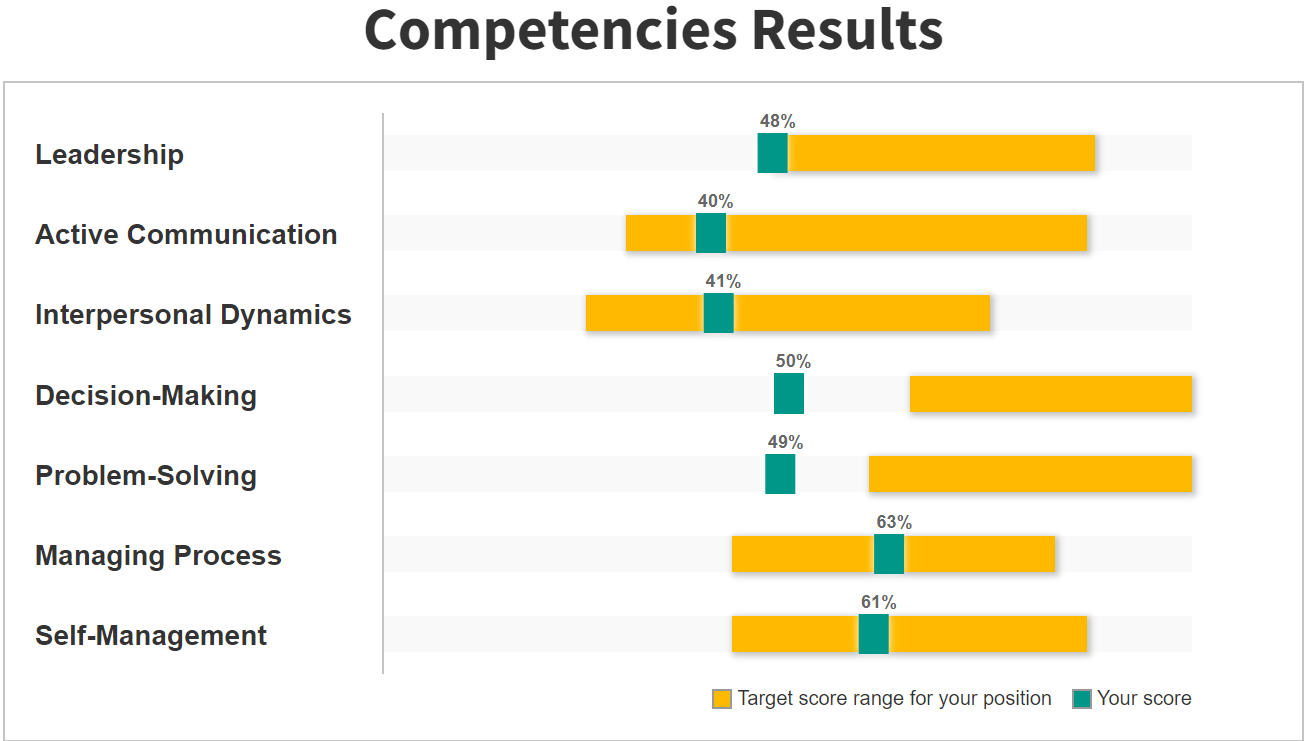
You will be provided with our guide to personality tests. It will introduce you to personality tests, the different question formats you may encounter, and how to approach the test in a way that will significantly increase your chances of success.
10
Learning hours
1 Full
Test simulation
324
test items
110
Videos
By the end of this course, you will be more knowledgeable and comfortable with the Caliper assessment – knowledge and familiarity with the test are the two most significant factors that can help you maximize your score and improve your chances of success.
Wishing you an enjoyable learning experience!
Benefits
Test insights
Anxiety Reduction
Test-Taking Tips
Cognitive Ability Skills
Curriculum
- Course Introduction
- About Caliper Assessment
- Personality/Behavioral Questions
- How to Pass Personality Tests
- Figural Inductive Reasoning Questions
- Number Series Questions
- Full-Length Hogan Test Simulations
- Course Conclusion
Customer Testimonial

I was honestly a bit skeptical because I had never heard of Iprep and there aren’t very many Caliper assessment practice sites. However, I am now consistently scoring perfect marks on the caliper test.
Jack Barry
October 18, 2022 at 11:50 AM
Reviews

Guy R*********
June 26, 2025 at 9:12 PM
I am raving about my experience. iPrep provide an "Ace your test" booklet and extent access to the resources if you rave about your experience, which is helpful.

Jessyca H*****
May 12, 2025 at 3:19 PM
The real Caliper test looked and tested very differently; for example, the Visual Analogy and Numbers Series were a lot more difficult than in the iPREP, so to me, the iPREP wasn't much of a help.

iPrep
May 13, 2025 at 6:11 AM
Thanks for your feedback Jessyca. While our prep has met the expectations of most students, we’re sorry it didn’t match your experience. The Caliper can vary by employer, and we’d appreciate any details you’re willing to share to help us improve.

Dezden P****
April 18, 2025 at 7:35 PM
fantastic product, easy to understand and if you are someone like me who values understanding methodology, you'll definitely appreciate this

Richard S*********
March 28, 2025 at 10:11 PM
The iPrep course gave me the familiarity and the confidence to do well on the test and to hopefully get hired!

Michael D**
March 19, 2025 at 6:02 PM
I had an amazing experience using the iPrep course to prepare for both the cognitive and personality tests. The course was well-structured with challenging practice tests that really helped me improve my problem-solving and time-management skills. I also appreciated the section on the personality test, which gave me valuable insights on how to approach the questions. The feedback after each test was super helpful, boosting my confidence and making me feel well-prepared. I highly recommend iPrep to anyone looking to ace both types of tests.

Scott E****
March 19, 2025 at 11:12 AM
I’ve had to take assessments before and had no idea how to approach them. The insights into the personality test were excellent and directly addressed what I was doing wrong. Also, the instruction for solving the visual and figural questions was invaluable. I never stood a chance before using this course.

Kevin P*****
March 16, 2025 at 8:52 PM
After applying for a Sales position, the employer requested I take the Caliper Assessment to see if I would be good for the position. I was unfamiliar with the Caliper Assessment. I am so thankful for iPrep! The explanation of the test and practice questions helped me know what to expect and understand strategies when answering questions. I am happy I was not caught off guard when I took the actual assessment and was relaxed and comfortable.

Kimmesha L**
January 28, 2025 at 12:53 AM
Amazing information within this assessment. It’s very helpful and makes my confidence feel more secure and ready to tackle this live caliper test tomorrow.

Anthony M********
January 27, 2025 at 3:37 AM
Very thorough test prep, it gave me a fantastic understanding of what to expect. Now, I'm fully prepared to score well on the Caliper test. Thank you!
